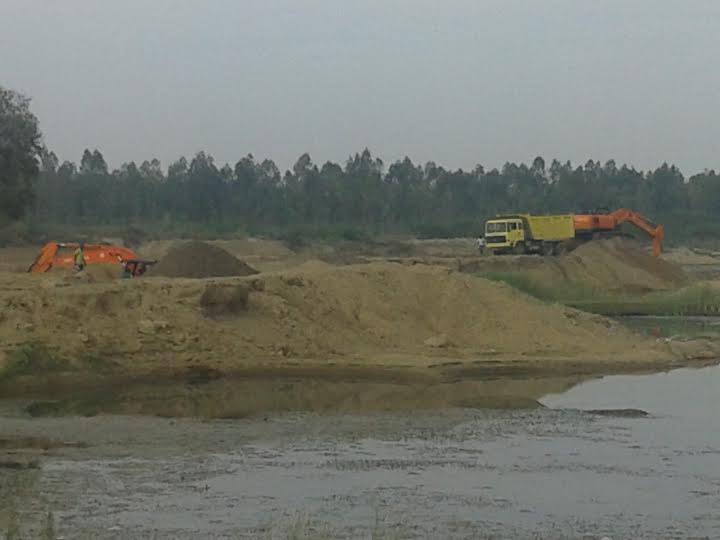You are travelling at night with your children, and suddenly a lorry stops in front of your car. A gang of thugs ambushes you and beats you in front of your kids. The entire episode lasts for about 10 minutes, leaving you helpless because any step against the goons will put your children at risk.
But you still get up, brush the dust off your shirt and acquire a stronger conviction than before. The ambush doesn’t scare you, if anything, it makes you repeatedly say in your head – ‘This is why I have to do this… this is why I have to do this’.
Such is the life of S Mugilan – a South Indian activist, holding his ground against the sand mafias of Tamil Nadu as activists and officials lose their lives in defence of the state’s rivers and beaches.
A resident of Chennimalai, a temple town on the banks of the Noyyal River in Tamil Nadu, S Mugilan left his job as an engineer in the state Public Works Department (PWD) to begin the life as an activist. His decision came in 1995 when a textile dyeing factory in Erode was found to be polluting the Noyyal River.
Mugilan recollects the death of a schoolgirl who went for a swim in a river and came out with skin burns. It is when he decided to commit to the cause of safeguarding the water bodies of Tamil Nadu. The factory responsible for sand mining and causing the death of the girl was shut as Mugilan collected one lakh signatures and held protests in Erode, forcing authorities to cave in.
It was around this time that Mugilan faced his first confrontations with the sand-mining mafia.
Since then, encounters with sand mafia has been a regular affair of Mugilan.
Mugilan is a strong supporter of social justice
Mugilan’s village, Chennimalai, has a history of protests. Even 200 years ago, the king of the region, Chinna Malai, defeated the British army thrice with the help of Tipu Sultan when the East India Company was trying to collect taxes.
As the textile belt of Tamil Nadu, Chennimalai has witnessed long-standing protests for labour rights in the textile industry.
Socialism is deep-rooted in him – the history of Tamil Nadu and the tradition of protests against corporations abusing labour and the environment has shaped his thoughts.
Mugilan is a farmer’s son. Even though his father wasn’t actively involved in activism, he never discouraged Mugilan from pursuing the same. When he was in college, his father was summoned many times to be informed about his student activism, but not once did he scold him. With no graduate college in his district, Mugilan enrolled on a mechanical engineering course in the town of Pollachi, around 100 kilometres away. College was the time when he discovered Marxist texts and the socialist philosophies of the self-respect movement, inspired by Periyar in Tamil Nadu.
Discovering the Tamil Nadu Marxist Party, he lost the interest in his job as an engineer at the state Public Works Department.
Mugilan’s fight against sand mining
Speaking to The Logical Indian, S Mugilan said, “Since the past 25 years, sand mining has been taking place in Tamil Nadu and affecting the state’s 33 rivers.”
The sand mafias, with political connections at the highest levels and in alleged connivance with local officials, are working overtime in the Cauvery region indiscriminately plundering sand, and selling it for hefty amounts. It is a Rs 3,000-crore-a-year business from 60 sand quarries located across 11 districts through which the Cauvery flows. The miners either indiscriminately dig loads of sand without permission from the PWD or obtain permits for certain quantity of sand but tend to scoop more than the allowed level.
“Sand that should have been taken in 100 years has already been scooped out. If it continues, the Cauvery delta will cease to exist,” revealed Mugilan.
This heavy exploitation of beach sand started with the real estate boom of the 1990s which increased the demand of sand exponentially. As per state government estimates, 5,500-6,000 truckloads of sand are mined in Tamil Nadu every day.
Rampant and illegal sand mining is largely profitable for the PWD. They sell per truckload for Rs. 20,000-Rs. 30,000 and much more, when out of state.
The Ministry of Environment, Forest and Climate Change stipulates that mining in many quarries are done only manually. Yet heavy equipment, like sand mining dredges are commonly used. Mining has led to major rivers, such as the Thamirabarani and the Palar, sinking 30 feet below ground level.
Tamil Nadu’s natural resources are being destroyed in the name of development. Sand mining has greatly depleted ground water levels. The 1,076-kilometre coastline and of all the 17 major river-basins that fall within the state’s border have sunk 10 metres or more below ground level in the last two decades.
“My protest is not only against the illegality of sand mining but the future of Tamil Nadu is at stake. If this persists the there will be no water left. Sand mining should be completely stopped for the…











